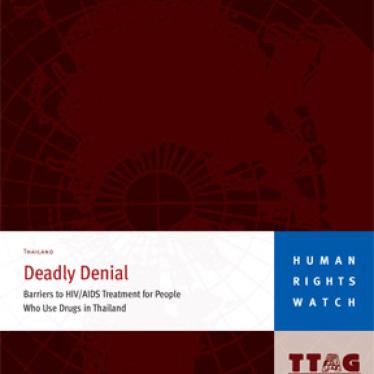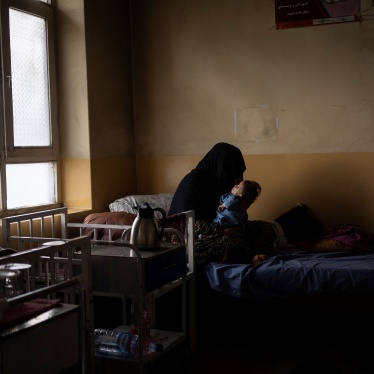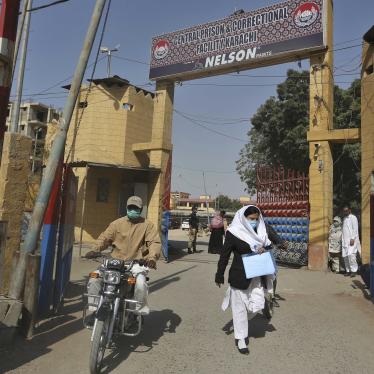(Bangkok) - Thailand’s failure to address the HIV epidemic in the hardest-hit population, drug users, is jeopardizing its record as a leader in the global fight against AIDS, Human Rights Watch and the Thai AIDS Treatment Action Group said today in a report released in advance of World AIDS Day.
In violation of its constitutional and international human rights obligations, the Thai government has systematically failed to prevent and treat HIV infection among drug users. The Thai government estimates that 40 to 50 percent of injection drug users are living with HIV in Thailand – virtually unchanged over the past two decades.
The 57-page report, "Deadly Denial: Barriers to HIV/AIDS Treatment for People Who Use Drugs in Thailand", found that routine police harassment and arrest – as well as the lasting effects of former Prime Minister Thaksin Shinawatra’s 2003 drug war – keeps drug users from receiving lifesaving HIV information and services that Thailand has pledged to provide. The report also documents how drug users face discrimination from health care workers, who continue to deny antiretroviral treatment to people who need it based on their status as drug users.
"Thailand wants to be seen as a success story in the fight against AIDS, yet it is failing to address the epidemic among the population hit hardest by HIV," said Rebecca Schleifer, advocate advocate with the HIV/AIDS and Human Rights Program at Human Rights Watch. "The Thai government has recognized that the HIV infection rate is 'unacceptably high,' and it has the expertise to address this public health emergency."
Thailand has been lauded as a global leader among developing countries for its aggressive HIV prevention programs and its efforts to provide universal access to HIV treatment. Yet Thailand never reached out with prevention programs to injection drug users.
In 2003 the government of former Prime Minister Thaksin launched a repressive "war on drugs" that resulted in the extrajudicial killings of at least 2,275 drug users or dealers. A lasting consequence of this campaign has been to drive many drug users away from effective HIV/AIDS prevention and treatment, out of fear of arrest and police violence.
In response to drug users’ advocacy, the Thai government has taken some steps to reduce some of the barriers for drug users to HIV services. In 2004, Thailand rescinded a national policy that explicitly permitted the exclusion of injection drug users from antiretroviral treatment programs.
But drug users still face serious obstacles in accessing needed health care. Many health care providers do not know or do not follow HIV/AIDS treatment guidelines, and continue to deny antiretroviral treatment to drug users, even those in methadone treatment programs.
"An HIV diagnosis is still a death sentence for most drug users in Thailand," said Paisan Suwannawong, director of the Thai AIDS Treatment Action Group. "Thailand must stop discrimination against drug users seeking health care services, or it will never meet its promise to ensure access to AIDS treatment to all who need it."
Out of fear of reprisal, drug users who do receive antiretroviral treatment are unlikely to tell their physicians about their drug use, or to seek information about drug dependence treatment from their antiretroviral treatment provider. This fear is not unfounded: the report confirms that many public hospitals and clinics share information about drug use with law enforcement, both as a matter of policy and practice. Some clinicians operated a "don’t ask, don’t tell" policy toward drug users, refusing to inquire about patients’ drug use or drug treatment history, in some cases despite knowledge or suspicion of current drug use or methadone treatment.
The government’s failure to ensure conditions in which safe exchange of information is possible compromises drug users’ access to adequate HIV and other health care services. As a result, drug users face harmful drug interactions without health care workers to consult about the dangerous potential consequences for their health and, ultimately, their lives.
The Thai authorities have provided minimal support for harm-reduction services for drug users, notwithstanding their proven effectiveness. These limited harm-reduction programs are seriously undermined by the government’s ongoing, repressive anti-drug campaigns. Police regularly interfere with drug users’ efforts to seek health care by harassing clients outside of drug treatment centers. Police also use possession of sterile syringes, or presence at a methadone clinic, as a basis for drug-related criminal charges.
"The Thai government pays lip service to its official policy, which is to treat drug users as patients rather than criminals," said Suwannawong. "In reality, police collect information about drug users from health clinics, and arrest peer outreach workers outside drug treatment clinics. Drug users risk criminal charges if they seek health care services which are theirs by right."
The report also found that incarcerated drug users have an even harder time obtaining needed HIV prevention, care and treatment services. Antiretroviral therapy is available only on an extremely limited basis to prisoners. Many Thai drug users spend time in pre-trial detention or prison, often cycling in and out of government detention facilities. The government has also failed to take measures to ensure that fundamental services (antiretroviral treatment and other HIV-related medical care, harm reduction, drug-dependence treatment, and psychosocial services) are coordinated in the general community, or with services provided on entry to or exit from prison.
Thailand’s new National AIDS Plan – launched in 2007 under the current military government of Prime Minister Surayud Chulanont – recognizes the authorities’ failures in combating HIV and AIDS among drug users and prisoners, and proposes to scale up efforts to ensure their access to HIV and AIDS prevention, care, and treatment services. This commitment follows a number of other similar public undertakings that have remained unfulfilled, however.
"Thailand needs to translate its written commitments on HIV/AIDS into action," said Schleifer. "If the authorities don’t immediately address the systematic human rights violations committed against drug users by police and health care providers, the government will be contributing directly to the continued spread of HIV."






